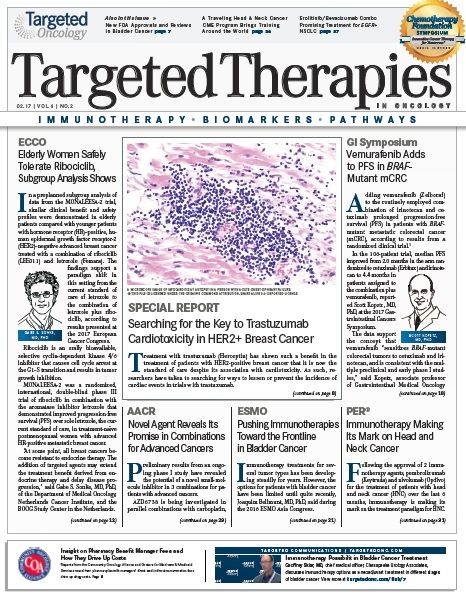Rare Cardiotoxicity Effects Founds With Checkpoint Inhibitors in Melanoma
As the oncology community adapts to using immunotherapy agents more frequently in cancer treatments, the fear over immune-related adverse events (irAEs) prevents many clinicians from fully trusting immunotherapies.
Douglas B. Johnson, MD
As the oncology community adapts to using immunotherapy agents more frequently in cancer treatments, the fear over immune-related adverse events (irAEs) prevents many clinicians from fully trusting immunotherapies. Although severe irAEs, especially cardiac events, are very rarely seen with checkpoint inhibitors, they are an area of concern that require further investigation.
Recent case reports of patients with melanoma experiencing immune-mediated cardiotoxicity caused by checkpoint inhibitors have shown that while these cardiac events are rare, they require attention to prevent these irAEs from occurring and to identify which patients are most at risk.
In a case report, Douglas B. Johnson, MD, and colleagues discuss 2 patients with melanoma who developed fatal myocarditis following treatment with the combination of nivolumab (Opdivo) and ipilimumab (Yervoy).1Both patients, a 65-year-old woman and a 63-year-old man, had hypertension, but no other cardiac risk factors, and yet they both developed myositis with rhabdomyolysis and myocarditis.
Autopsies showed immune infiltration in the cardiac and skeletal muscle in both patients, yet no other tissues were affected. Infiltrating cells within the myocardium and skeletal muscle showed CD3 or CD68 and an abundance of CD4+ and CD8+ T cells. In the rst patient, herpes simplex virus 1 sequences were found postmortem in the heart tissue, and in the second patient, Epstein-Barr virus was detected in the heart tissue; however these conditions have not been associated with myocarditis. No viral infections of the heart were detected.
Common high-frequency T-cell receptor sequences were found in both patients in in ltrates from the cardiac muscle, skeletal muscle, and tumors. Johnson et al noted that the number of shared clones increased following treatment with the PD-1 and CTLA-4 checkpoint inhibitor combination.
The investigators said that the joint findings suggested that antigens present in the myocardium, skeletal muscle, and tumors could have been recognized by the same T-cell clones, and believed that both cases were T celldriven drug reactions. Ipilimumab and nivolumab together enhance T-cell responses in cardiac and skeletal muscle, which often leads to autoimmune cardiotoxicity (FIGURE).2
Feixiong Cheng, PhD, and Joseph Loscalzo, MD, PhD, suggest that further studies are needed to investigate the genetic pro les and molecular mechanisms of these cases, and other incidences of cardiotoxicity from checkpoint inhibitors to determine if they could have had a role in the cardiac events.
Johnson and the co-investigators assessed the frequency of myocarditis and myositis seen with treatment of either agent from the Bristol-Myers Squibb (the manufacturer of both agents) corporate safety databases.1As is frequently seen with AEs, the rate of myocarditis was increased with the combination versus nivolumab alone, with 5 cases noted with the combination, compared with 1 case seen with nivolumab monotherapy (0.27% vs 0.06%; P <.001). Severe myositis was noted in 0.24% with the combination compared with 0.15% with nivolumab alone.
In another case series, Lucie Heinzerling, MPH, and colleagues identified 8 patients across 6 cancer centers with melanoma who were experiencing immune-related cardiotoxicity from treatment with either ipilimumab, nivolumab, or pembrolizumab (Keytruda), another PD-1 inhibitor.3
Among the 8 cases, 7 patients received treatment with ipilimumab, 1 of whom also received nivolumab. There were 2 cases of cardiomyopathy, 4 cases of myocarditis, 1 of cardiac arrest, 1 of myocardial brosis, and 2 cases of heart failure. Three patients died as a result of their irAEs, including 2 patients who developed myocarditis and 1 from myocardial brosis.
Prior history of cardiac pathology was noted in 5 of the 8 patients (63%), indicating that the cardiovascular events could have been due to a worsening of the patients’ previous disorders. However, the authors noted that all of the patients were free of symptoms when starting immunotherapy. The close monitoring of patients with preexisting cardiac conditions and prompt management of any irAEs could prevent more cases of fatal cardiotoxicity, the authors concluded.
In addition, other irAEs affecting other organs were noted in 5 patients (63%), with 2 patients experiencing hypophysitis and 2 experiencing autoimmune hepatitis. In a presentation at the 2015 ASCO Annual Meeting, it was noted that ≥2 organ systems were affected in 31% of patients treated with the combination of nivolumab and ipilimumab, and 7% of patients treated with nivolumab alone.4In the case series, the 1 patient receiving the combination of nivolumab and ipilimumab did experience addi- tional irAEs, including thyroiditis and hypophysitis, in addition to myocarditis and cardiomyopathy.3
“Thus, special attention needs to be focused on patients who have already experienced 1 irAE,” Heinzerling et al said. The authors also noted that irAEs are typically associated with lymphocyte infiltration of the affected organ. However, predictive biomarkers for identifying which patients and which organs are most likely to be at risk for severe cardiotoxicity with treatment from checkpoint inhibitors are lacking.
References:
- Johnson DB, Balko JM, Compton ML, et al. Fulminant myocarditis with combination immune checkpoint blockade. N Engl J Med. 2016;375(18):1749-1755. doi:10.1056/NEJMoa1609214.
- Cheng F, Loscalzo J. Autoimmune cardiotoxicity of cancer immunotherapy. [Published online December 2, 2016] Trends Immunol. 2017;38(2):77-78. doi:10.1016/j.it.2016.11.007.
- Heinzerling L, Ott PA, Hodi FS, et al. Cardiotoxicity associated with CTLA4 and PD1 blocking immuno- therapy. J Immunother Cancer. 2016;4:50. doi:10.1186/s40425-016-0152-y.
- Hodi FS, Postow MA, Chesney JA, et al. Clinical response, progression-free survival (PFS), and safety in patients (pts) with advanced melanoma (MEL) receiving nivolumab (NIVO) combined with ipilimumab (IPI) vs IPI monotherapy in CheckMate 069 study. J Clin Oncol.2015;33 (suppl; abstr 9004).

Biomarker Testing Paves the Way for Better Targeted Therapies in NSCLC
April 16th 2024At a live virtual event, Edward S. Kim, MD, MBA, discussed the evolving landscape of biomarker testing before making treatment decisions for patients with early-stage non–small cell lung cancer (NSCLC).
Read More